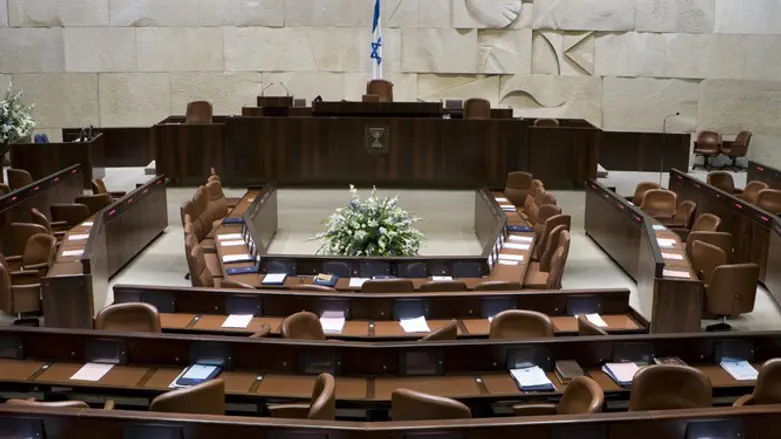
Prime Minister Benjamin Netanyahu’s decision in May to propose new elections rather than return his mandate to form a government to President Reuven Rivlin backfired. The September 17 election changed the political landscape without lifting the confusion.
The two largest parties lost seats. The Likud -- this time after merging with Moshe Kahlon’s Kulanu -- lost most. Instead of 38 seats, it now only holds 31. Blue and White, which gained 35 seats, will hold 33. Likud's religious partners in the center right bloc, could not compensate for the Likud’s loss of seats. The haredi Sefardi Shas gained one seat and now holds 9, the haredi Ashkenazi United Torah Judaism remained stable with 8 seats and the enlarged Religious Zionist Yamina holds 7 seats, a gain of 2.
The right of center/religious bloc which could not form a government after the April election because it held 60 seats now remains with 55. Yet it is too early to claim that the Netanyahu area is over as some local and foreign media did.
The extreme right wing Otzma Yehudit Party did not pass the threshold. This contrary to predictions in several of the last polls prior to the election. Yet even if it had pulled out before the election, it would not have changed the overall situation significantly as it got enough votes for only three seats. Shortly before the election date, another religious party, Noam announced that it would not participate in the election.
Neither can Blue and White leader Benny Gantz form a government. With his natural partners, Labor-Gesher holding 6 seats and the extreme left wing Democratic Union with 5 seats, his bloc only holds 44 seats, one less than in the April 2019 election. To form a government Gantz would need support from two additional parties. One is Israel Beyteinu which now holds 8 seats, a gain of 3. Its leader Avigdor Lieberman has said that he will only support a unity government of Blue and White and the Likud.
Furthermore, Gantz would need support of most of the members of the Joint Arab List which gained 3 seats and holds 13. Such support might not be palatable to a number of right wing Blue and White MKs.
Forming a unity government is difficult because Blue and White has stated that it will not sit in a government with Netanyahu. Netanyahu is temporarily in an advantageous position. As long as there is no new government, he continues to be prime minister. A possible indictment of him for fraud in the coming months may change the situation. Pressure to resign on Netanyahu will then increase. If that happens a unity government becomes more likely.
Another scenario is that some of the MKs' of one of the blocks would defect. A question is also whether Gantz can keep Blue and White, which consists of three parties, together.
Former Prime Minister Ehud Barak, created a new party in July,
The Israel Democratic Party. He said that "it would bring back hope and courage to the country." The polls however did not show that it had much support.
Thereafter a new grouping was formed on the extreme left called the Democratic Union. Its main component was the Meretz party, which received 4 seats in April. The Israel Democratic Party also joined it along with a number of Labor party defectors led by Stav Shaffir, who for this move had to give up the Knesset membership she gained with Labor in April.
The Democratic Union became the smallest party in the Knesset. The consequence was that Arab outgoing Meretz MK Assawi Frej, the only Arab MK outside the Joint List, will not be in the Knesset. His place will be taken by the Israel’s Democratic Party’s only MK, retired deputy chief of staff, Yair Golan. Stav Shaffir regained her MK seat.
Meretz had agreed to join forces with the Israel Democratic Party only after Barak had apologized for the deaths of Arab protestors during the October 2000 riots, when he was prime minister. It was a condition of Frej who now has lost his seat to Golan. Meretz lost one seat in April and one more now remaining with only 3 MKs.
One should also compare the results of these elections with those of 2015. A major conclusion is the abysmal decline of Labor. Then, under the leadership of Yitzhak Herzog and jointly with Tzipi Livni’s The Movement gained 24 seats. In the April 2019 elections it fell to 6 seats. Now under the new-old leadership of Amir Peretz it only maintained this number of seats due to joining forces with Orly Levy-Abekasis’ Gesher movement.
Contrary to expectations that voter turnout would decrease, the opposite was the case, there was a small growth due to the increase in Arab voters. There are also personal consequences. There will be an estimated 16 new Knesset Members, spread over a variety of parties. Some 12 MKs' elected in April will lose their seats, of which 7 are from Likud, 2 from Blue and White and 2 from Yamina. Four others, of which 3 from Labor decided not to be candidates this time.
Other scenarios than the aforementioned are possible. Major security problems could justify a unity government without preconditions. Also a third election cannot be totally excluded.

